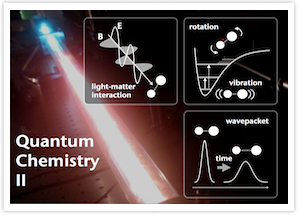Quantum Chemistry II

| Lecturer | Akiyoshi HISHIKAWA, Professor |
|---|---|
| Department | School of Science / Graduate School of Science, 2011 Spring |
| Recommended for: | School of Science Department of Chemistry 3rd year students (2・1.5 hours / session One session / week 15 weeks / semester) |

Course Objectives & Aims
To reveal how matter interacts with light is one of the central questions of science, the investigation of which has laid the foundation of various branches of modern science, including quantum mechanics. Among these, the developments in spectroscopy, which captures the state of a material by observing its response to the change of light parameters, such as wavelength etc, played a major role in the development of material science. In this course, we will learn what kind of information can be derived from molecular spectra by studying the interaction of molecules with light and quantum mechanics of nuclear motion.
Key Features
Taking some fundamental laws as a starting point, we will consider what kind of information can be revealed about molecules by deducing how to process a simple quantum system, the interaction of molecules with light. To make the logical steps clear, the derivation of the equations will be explained using the blackboard. The lectures will be conducted giving special consideration in order to make imagining the phase of a molecule living in the quantum world possible.
Course Requirements
I. Light and Molecules
- Properties of light / Light as electromagnetic waves / Interaction between molecules and light / One-photon process / Two-photon process
II. Molecular spectra
- Electronic transition / Vibrational transition / Rotational transition / Spectra of gas molecules
III. Molecular Dynamics
- Quantum wavepackets / Correlation functions and spectra
Course Conditions
It is highly recommended that you take the course "Quantum Mechanics I" beforehand.
Related Courses
Quantum Mechanics I
Related Resources
D.Tannor, "Introduction to Quantum Mechanics", University Science Books
Grading
Evaluation will be based on reports and assignments.
Last updated
March 17, 2020
